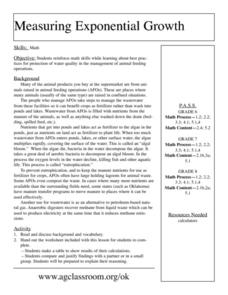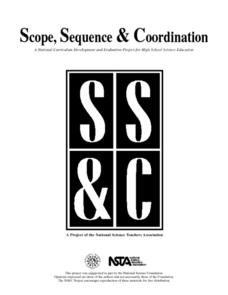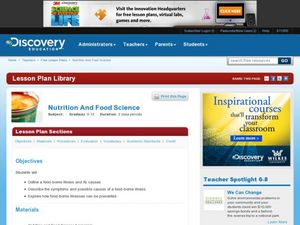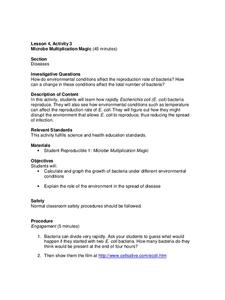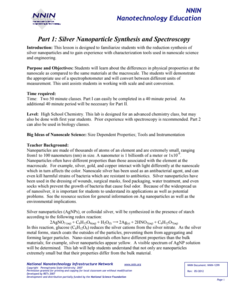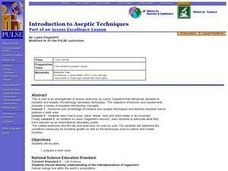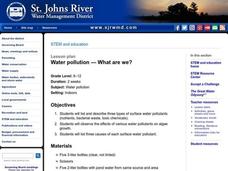Curated OER
Active Ingredient Screening Test for Plants
Young scholars explore the growth of bacteria. They determine if various plant materials contain active ingredients that inhibit the growth of bacteria. In addition, they complete a student data sheet.
Curated OER
Bacterial Transformation
Students explore DNA recombination. In this biology lesson, students observe the growth of microscopic species. They predict the phenotype of the transformed colonies.
Curated OER
How Can You Prevent Spoilage?
Students complete laboratory activity to discover what temperature is most effective in prohibiting bacterial growth in two percent milk. Students then write lab report detailing findings.
Curated OER
Foiling Spoilage
For this agricultural education worksheet, students read 6 descriptions of bacteria that cause food spoilage. Students then read 4 descriptions of preservatives that can be used to prevent spoilage. The worksheet is meant as a display.
Curated OER
Predicting the Growth of Microorganisms
Students determine where microorganisms might be found around their school. In this scientific investigation lesson, students collect cultures from various locations and place these in petri dishes. They incubate the cultures to see if...
Curated OER
Measuring Exponential Growth
Middle schoolers reinforce math skills while learning about best practices
for protection of water quality in the management of animal feeding
operations. They make a table to show results of their calculations and compare and justify...
Polar Trec
Do Microorganisms Live in Antarctica?
Can microorganisms live in the dry, cold climate of Antarctica? Young scientists view a research project measuring microorganisms in the Taylor Glacier. They record the findings from dirty ice, clean ice, boots, sediment, and more. Then...
Learning Games Lab
Testing and Adjusting pH
Pupils learn how to control food spoilage by adjusting the food's pH. They see that one of the most dangerous bacteria can grow in food if people don't handle and store food properly. Using knowledge of the bacteria's preferred pH,...
Curated OER
Limiting Factors for Populations
The "Bottled Bacteria" activity instructions are a bit unclear, but the remaining activities investigating limiting factors in ecosystems are well-written. Learners model the exosystem of a bear and a herd of deer. They set up a...
Curated OER
Antibiotic Resistance
Students using the scientific method, study bacteria as a covering surface of the earth in many forms. They discover that not all bacteria is bad and introduce the topic of antibiotic resistance. Science Fair expectations are addressed.
Curated OER
Determining the Effectiveness of Handwashing
Students participate in an experiment in which they grow bacterial colonies. They examine the effects of antibiotics killing the germs. They discuss their findings to end the lesson.
Curated OER
Nutrition and Food Science
Students examine the causes and symptoms of food-borne illnesses and ways to prevent them. In this nutrition lesson students work in teams to investigate a type of food-borne illness and present a scenario about it.
Curated OER
Food Preservation
Students examine the different food canning methods and how to be safe canning. In this canning lesson students examine the hazards of improperly canning.
Curated OER
Micro-organisms
Students discuss micro-organisms. In this micro-organisms lesson, students identify which micro-organisms are harmful and which ones are beneficial. Students complete a worksheet which is included in the lesson.
Centers for Disease Control and Prevention
Microbe Multiplication Magic
A lesson introduces the reproduction rate of E. coli though a video. Then scholars complete a data table and graph of reproduction rates in ideal conditions as well as less than ideal conditions.
Teach Engineering
How Antibiotics Work
Take two pills and call me in the morning. The first lesson in a short unit of four introduces class members to delivery methods of medicines. The instruction introduces the question of which delivery method is best to get you feeling...
National Nanotechnology Infrastructure Network
Silver Nanoparticle Synthesis and Spectroscopy
Certain materials do not always maintain the same physical properties when they exist in the nanoscale. Help your classes to explore this idea through an experimental lesson. Scholars use spectroscopy with samples of silver solution to...
Rain Bird Corporation
Rain Forest Teaching Curriculum
Take young naturalists on an exploration of the world's tropical rainforests with this extensive collection of lessons and activities. Whether its creating leaf and flower prints or investigating the absorption spectrum of chlorophyl,...
Curated OER
E. coli and Their Human Environment
Students are able to observe how environmental changes (antibiotics) affect the growth of E. coli. They are able to use the "F" test for statistical analysis. Students can explain that E. coli is a common rod-shaped intestinal...
Curated OER
Introduction to Aseptic Techniques
Students study bacteria and aseptic microbiology laboratory techniques. They discover how to pour, label, streak, seal and store plates in an incubator and articulate what they have learned via an informational laboratory poster.
.
Curated OER
What Are We?
Students list and describe three types of surface water pollutants. They observe the effects of various water pollutants on algae growth. Three causes of each surface water pollutant is listed.
Curated OER
Food Safety Lab-Part 3 Cross Contamination andHygiene
Students observe the effect of croos contamination as they inoculate orange juice with penicillin mold from the refrigeration lab and active yeast solution from the sterilization lab. They experience a simulation of passing bacteria...
Curated OER
Investigating the Method by Which the Body Defends Against Pathogens
Students explore disease caused by bacteria and viruses, how they are transmitted, and how they exert their effects on their hosts. They explain how diseases, such as AIDS, are spread by exponential growth.
Curated OER
Funky Fungus
Students discuss decomposition, bacteria, fungi and other microscopic organisms. They participate in an experiment to grow fungus on bread. As the fungus colonies grow, students observe them under a microscope to identify and locate...
Other popular searches
- Bacteria Growth Requirements
- Bacteria Growth on Bread
- Bread Bacteria Growth
- Bacteria Growth Safety
- Exponential Bacteria Growth
- Bacteria Growth Medium Agar
- Germs Bacteria Growth
- Bacteria Growth Requirenents
- Bacteria Growth on Pizza
- Bacteria Growth Rate







